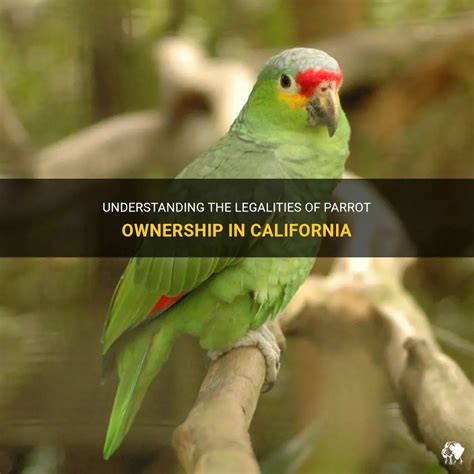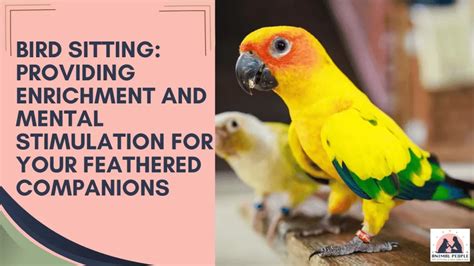Have you ever found yourself fantasizing about the captivating beauty and playful nature of feathered creatures? The allure of owning a pet that can mimic human speech and display a vibrant array of colors is undeniable. If you have been pondering the idea of welcoming a parrot into your home, it is essential to familiarize yourself with the diverse aspects that come along with this unique companionship.
Parrots, those magnificent creatures of the avian world, have an uncanny ability to captivate and enthrall with their enchanting plumage and charismatic personalities. These intelligent birds possess a remarkable capacity for communication, often mimicking various sounds, words, and even complex phrases. The bond that can be forged with a parrot is unlike any other, as they are known for their affinity for human interaction and their remarkable ability to form lasting relationships.
However, it is crucial to understand that feathered companions require special care and attention. From providing a suitable habitat to fulfilling their nutritional needs, there are several factors to consider before welcoming a parrot into your life. This comprehensive guide aims to shed light on the key aspects of parrot ownership, helping you navigate the challenges and rewards that come with this delightful journey.
Throughout this article, we will delve into the diverse species of parrots, exploring their unique traits and characteristics, as well as the considerations to keep in mind when selecting the perfect avian friend for your household. We will also discuss the essential aspects of creating a nurturing environment, from setting up an enriching cage to ensuring their dietary needs are met adequately. Additionally, we will explore the training and socialization techniques crucial for fostering a healthy relationship with your feathered companion.
Embark on a captivating journey into the world of parrots, discovering the immense joy that can be found in their vibrant plumage, their melodious songs, and their boundless affection. Join us as we delve into the intricacies and delights of this remarkable species, equipping you with the knowledge and understanding necessary to embark on a fulfilling and enriching partnership with these extraordinary creatures.
Understanding the Responsibility of Parrot Ownership

Embarking on the journey of becoming a parrot owner goes far beyond mere desire or wishful thinking. It involves a deep understanding of the commitment and responsibility that comes with caring for these intelligent and sociable creatures. In order to provide a nurturing and fulfilling environment for a parrot, it is essential to comprehend the level of dedication, time, and effort required.
Commitment: Parrot ownership demands unwavering commitment due to the long lifespan of these magnificent birds. Depending on the species, a parrot can live for several decades, which means taking on the responsibility of their care is a lifetime commitment. They require consistent attention, love, and care throughout their lives, ensuring their physical and mental well-being.
Time: Owning a parrot necessitates setting aside ample time for their daily needs. These intelligent birds crave social interaction, mental stimulation, and physical activity. Regular playtime, training sessions, and physical exercise are crucial to keep them mentally sharp and physically fit.
Effort: Parrots are highly intelligent creatures, often possessing the emotional and intellectual intelligence equivalent to that of a young child. They thrive on mental stimulation and require an ever-changing environment to prevent boredom and behavioral issues. Owners must be willing to dedicate time and effort to provide activities such as puzzle toys, foraging opportunities, and socialization with people and other animals.
In conclusion, understanding the commitment involved in parrot ownership is essential before embarking on this journey. It requires a long-term commitment, dedicated time, and consistent effort to provide these intelligent and sociable creatures with the love and care they deserve.
Choosing the Perfect Parrot Species for Your Lifestyle
When it comes to selecting the ideal parrot species that fits your lifestyle, it is crucial to consider a variety of factors. The diverse world of parrots offers an extensive range of breeds, each with unique characteristics and requirements. By understanding your own preferences and capabilities, you can make an informed decision that ensures a harmonious and fulfilling relationship with your feathered companion.
| Species | Size | Temperament | Noise Level | Intelligence |
|---|---|---|---|---|
| African Grey Parrot | Medium to large | Highly intelligent, social, and affectionate | Moderate | Recognized as one of the most intelligent parrot species |
| Cockatiel | Small | Playful, social, and relatively easy to handle | Low | Known for their ability to mimic sounds and whistle |
| Macaw | Large | Strong-willed, loyal, and highly trainable | High | Require consistent mental stimulation and physical exercise |
| Budgerigar | Small | Curious, sociable, and easily tamed | Low | Notably intelligent and capable of learning tricks |
By evaluating the size, temperament, noise level, and intelligence of various parrot species, you can match their characteristics with your living situation, personality, and level of commitment. For instance, if you live in an apartment with noise restrictions, a species known for its loud vocalizations may not be the best fit. On the other hand, if you have an active lifestyle and enjoy engaging your pet in stimulating activities, a highly intelligent parrot species may be a wonderful companion.
Remember, each parrot species has unique care requirements, including diet, habitat, and interaction needs. Researching extensively and consulting with experienced avian professionals will help ensure that you choose the parrot species that aligns best with your lifestyle and abilities. Ultimately, selecting the right parrot species will contribute to a fulfilling and lifelong relationship, bringing joy and companionship to both you and your feathered friend.
Creating an Appropriate Living Environment for Your Feathered Companion

Providing a proper habitat for your avian friend is crucial to ensuring their well-being and overall happiness. Establishing a suitable living environment involves various factors that contribute to the physical and mental health of your parrot.
One of the key aspects to consider when creating a suitable living environment for your parrot is the size and type of cage. Parrots require spacious cages that allow them to move around freely and engage in stimulating activities. The cage should be large enough to accommodate their wingspan and provide ample room for perches, toys, and other accessories.
Choosing appropriate bedding material is another important consideration. Opt for materials that are non-toxic, easy to clean, and provide a comfortable surface for your parrot's feet. Avoid using cedar chips or sawdust, as they can be harmful to your feathered companion's respiratory system.
Proper lighting is essential for a parrot's well-being. Ensure that their living area receives natural sunlight or invest in full-spectrum lighting to mimic the benefits of natural sunlight. This will help maintain your parrot's circadian rhythm and promote healthy behaviors.
Environmental enrichment plays a vital role in keeping your parrot mentally stimulated. Provide a variety of toys, puzzles, and foraging opportunities to keep your parrot entertained and prevent boredom. Rotate toys regularly to maintain their interest and challenge their cognitive abilities.
Another vital aspect to consider is the temperature and humidity of your parrot's living environment. Parrots are sensitive to extreme temperatures and require a stable and comfortable climate. Avoid exposing them to drafts or direct heat sources, and use a hygrometer to monitor and maintain appropriate humidity levels.
Cleanliness is essential to prevent the buildup of harmful bacteria and maintain a healthy living environment for your parrot. Regularly clean and disinfect their cage, food and water dishes, as well as any accessories or perches. Provide fresh food and water daily to ensure your parrot's nutritional needs are met.
In conclusion, creating a suitable living environment for your parrot involves considering factors such as cage size, bedding material, lighting, environmental enrichment, temperature, humidity, and cleanliness. By providing a comfortable and stimulating habitat, you can ensure the overall well-being and happiness of your feathered companion.
Proper Diet and Nutrition for a Healthy Parrot
A vital aspect of ensuring your cherished avian companion remains vibrant and in optimal health involves providing them with a well-balanced diet and proper nutrition. Offering a varied and nutritious diet not only contributes to their overall well-being but also helps to prevent potential health issues.
Quality Seeds and Pellets: One of the fundamental components of a parrot's diet is seeds and pellets. These provide essential nutrients such as proteins, carbohydrates, vitamins, and minerals. It is crucial to select high-quality seeds and pellets that are appropriate for your parrot's species, as each has specific dietary requirements.
Colorful Fruits and Vegetables: In addition to seeds and pellets, incorporating a wide range of colorful fruits and vegetables is paramount. These provide essential vitamins, antioxidants, and fiber that promote good overall health. Be mindful of offering a variety of fruits and vegetables that are safe for your parrot to consume, as certain foods may be toxic to them.
Protein Sources: Including protein sources in your parrot's diet is crucial for their muscle development and overall bodily functions. Offer cooked and unsalted beans, lentils, peas, and tofu as great sources of plant-based proteins. Additionally, lean meats such as chicken or fish can be given occasionally but should be thoroughly cooked and without any seasonings that may harm your parrot.
Vitamin and Mineral Supplements: To ensure your parrot receives all the necessary vitamins and minerals, considering appropriate supplements can be beneficial. However, it is essential to consult with an avian veterinarian before adding these to your parrot's diet, as excessive amounts can be harmful.
Remember, maintaining a balanced and nutritious diet is vital for the overall health and longevity of your feathered friend. Regularly evaluate their diet and consult with a qualified avian veterinarian to provide the best possible care for your parrot's specific nutritional needs.
Building Trust and Establishing a Strong Bond with Your Feathery Companion

When welcoming a pet parrot into your life, it is essential to prioritize building trust and forming a deep bond with your avian companion. Creating a strong and loving relationship with your parrot requires time, effort, and patience, as well as understanding their unique needs and behaviors.
A solid foundation for trust can be established by providing a safe and secure environment for your parrot to thrive in. Ensuring their physical well-being through a well-maintained living space, proper nutrition, and regular veterinary care is crucial. Additionally, it is important to create a positive and nurturing atmosphere by offering mental stimulation, ample social interaction, and plenty of love and attention.
Communication plays a vital role in building trust and bonding with your parrot. Learning their body language and vocalizations will enable you to understand their moods and preferences better. Engage in gentle and consistent interaction, using a calm and soothing voice, to convey your intentions and build rapport. This will help your parrot feel comfortable and secure in their relationship with you.
Patience is key when establishing trust with a parrot. Each individual has their own unique personality and history, therefore, some parrots may take longer to warm up and trust their human caregiver. It is important not to rush the process and allow your parrot to gradually become more comfortable in your presence. By showing patience and understanding, you will earn their trust and strengthen your bond over time.
| Key Points: |
| - Provide a safe and secure environment |
| - Offer mental stimulation and social interaction |
| - Learn and understand your parrot's body language and vocalizations |
| - Engage in gentle and consistent interaction |
| - Show patience and understanding |
FAQ
What should I know before owning a parrot?
Before owning a parrot, there are a few things you should know. Firstly, parrots require a lot of time and attention. They are social creatures and need daily interaction and mental stimulation. Secondly, parrots can be noisy, so if you live in an apartment or have sensitive neighbors, it's important to consider this. Additionally, parrots have specialized dietary needs, so it's essential to provide a balanced diet. Lastly, parrots have a long lifespan, with some species living up to 80 years, so owning a parrot is a long-term commitment.
What are the different species of parrots available for pet ownership?
There are numerous species of parrots that can be kept as pets. Some popular choices include the African Grey Parrot, Amazon Parrot, Cockatoo, Macaw, and Cockatiel. Each species has its own unique characteristics and care requirements, so it's important to research and understand the specific needs of the species you are interested in before making a decision.
How can I provide mental stimulation for my pet parrot?
Mental stimulation is crucial for the wellbeing of pet parrots. There are various ways to provide this, such as offering a variety of toys that encourage problem-solving and play. Providing opportunities for foraging, such as hiding treats in toys or cardboard boxes, can also keep your parrot mentally stimulated. Additionally, regular interaction and training sessions with your parrot can help keep their minds active and engaged.
What are the potential health issues that parrots may face?
Parrots can be prone to certain health issues, so it's important to be aware of these. Common health problems in parrots include respiratory infections, nutritional deficiencies, feather plucking, beak and feather disease, and psittacine beak and feather disease. Regular veterinary check-ups, a balanced diet, proper hygiene, and a clean living environment can help prevent many of these health issues.
What are some important considerations for parrot ownership for first-time pet owners?
For first-time pet owners considering a parrot, there are a few important considerations. Firstly, it's advisable to start with a small or medium-sized parrot species that is known to be more manageable and less demanding. Secondly, be prepared for the noise that parrots can produce, which may not be suitable for everyone. Additionally, having a proper understanding of their dietary needs, housing requirements, and the time commitment involved is essential. Lastly, it's recommended to attend parrot ownership classes or seek advice from experienced parrot owners to ensure you are well-informed and prepared.



